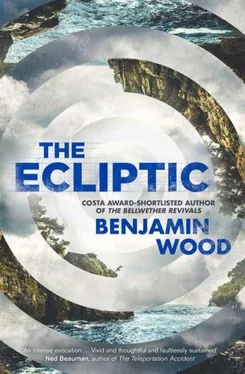It was definitely Jim’s handwriting. My heart was shuddering and so was my jaw, but I managed to get the words out: ‘Do you know if Jim was here earlier?’
‘Who?’ Kerr said.
I showed him the page.
‘Never heard of him,’ he said. ‘Who is he?’
I held the book tight. ‘A friend of mine.’
Kerr nodded. He eyed the tome of condolences vised against my chest. ‘You bringing that along for Mrs H? Good thinking.’

The Colquhoun Arms was less than half a mile from the church, back on the road where the bus had dropped me. Beyond the windscreen of Kerr’s Cortina, the outlying hills were yellowed by sunshine. Low clouds seeped across the birdless sky. The treetops softly stirred. We drove in silence. The squat grey cottages of Luss smudged beside Kerr’s head. When he wheeled into the parking space, I jumped out of the car so fast I almost left my case on the back seat. ‘Steady, love,’ he said. ‘It’s open bar.’
I hauled my suitcase across the car park and dumped it by the coat racks. One corner of the pub had been roped off for the function. A huddle of glum-faced men in black were sitting at a long table with sandwiches, supping pints and rolling whisky in short glasses. There was no sign of Jim Culvers. I checked the corridors, the snug, the dark ends of the place. I peered into the Gents, but there was just a bald old fellow standing at the urinal. The barmaid saw me coming out and said, ‘It’s the other one, hen. We need to change that sign. I keep telling ’em.’
Mrs Holden was in a wingback near the fireplace, clutching a tissue. A grey-haired lady was crouched beside her. Approaching them, it occurred to me that they must have been twins. They had equally flat noses and high foreheads, and they both turned to me with the same mannequin expressions as I hovered near them, waiting to speak. ‘Mrs Holden,’ I said. ‘You probably don’t know me, but I knew your husband. He was my favourite teacher. I’m just so sad to lose him.’ It came out as ingenuously as I hoped it would. The sister stood up and said, ‘I’ll get you that brandy, Mags, OK?’ She left us alone.
Mrs Holden hung a stare on me, lids twitching. ‘So good of you to come,’ she said. And she had to bite on her lip to keep from crying. ‘Were you in—’ She cleared her throat. ‘I’m sorry. Were you in his mural class?’
‘I was. I came up from London as soon as I heard.’
‘Oh, that’s really good of you.’ She gulped something down. ‘And what is it you do now?’
‘I’m an artist,’ I told her.
‘You make a living that way, do you?’
‘Yes.’
‘A good one?’
I did not know if it was right to smile, but I did. ‘Yes.’
‘Oh, how lovely. He was always so proud of his students. Did you know Geoff Kerr? He’s here somewhere, I think.’
‘Yes, I just got a lift with him.’
‘A good lad, Geoff. He’s been such a help.’ Mrs Holden sniffed in a long breath. And, seeing the condolence book under my arm, she said, ‘Is that for me?’
‘Yes. I’m sorry — of course.’ I gave it to her. ‘I was wondering if you knew where I could find an old friend of mine. Jim Culvers. He was at the service, but I can’t see him here.’
Idly turning through the book, she said, ‘Who?’
‘He’s another student of Henry’s.’ I showed her the page with Jim’s message.
She moved her eyes over the words, but there was no glint of recognition in them. ‘James Culvers. No. I’m sorry. I don’t know who that is.’ And she paused, considering the empty fireplace. ‘There was an old student of Henry’s renting the cottage last summer, but I don’t recognise the name. Culvers — I’d remember that. This fella’s name began with a B. Bailey, or Bradley, or something like that. Henry never got me involved.’
‘The cottage?’
‘Aye,’ she said. ‘His father’s place. He liked to come out and paint there sometimes. Then his hands got too sore, and he preferred having the money is his pocket. We planned on selling, but it wouldn’t be worth a lot now.’ When I asked for the address, she wafted her hand. ‘Ach, it’s not far. Get to the pier and turn left. It’s the only house on the water that’s not been looked after — you can’t miss it. What was your name again, love, did you say?’
‘Elspeth.’
‘Elspeth what?’
‘Conroy.’
‘I’ll keep an eye out for it,’ she said. ‘In the papers.’
I touched her hand. The skin felt thin as a cobweb. ‘Take care, Mrs Holden.’
‘Aye, you too. Thanks for coming.’

It was one harsh winter away from a wreck — a simple stone cottage with a pitched slate roof, so bearded with moss it was already bowing. There was a pale craquelure on the window frames, hay-coloured, moulting. The gutters were shot. The door glass was patched up with tape. A trampled path meandered up to the house, away from the brow of the loch, where the steel-blue water roiled quietly and a clutch of white sloops lilted on their moorings. I walked up the slope, skimming the waist-high grass with my palm, until I came to a doorstep, half painted black. There were old net curtains at the windows, dishes on the outer sill with food scraps: brown-bread crusts and pickle, a saucer ringed with coffee. But there was no sign of movement inside. I knocked several times and nobody answered.
There was no letterbox to peer through, and the windowpanes were coated in a sooty grime that made it difficult to see beyond the nets. I put my case down and side-stepped through the weeds. At the back of the house was a small garden, overrun with nettles, and a dank wooden outhouse. Behind it, a bank of firs, and two great hummocks pushing at the clouds. There was just one downstairs window, looking into the kitchen — a newspaper was on the table, but I could not read the headlines or the date. If the place was lived in, it was lived in sparely. The tap was dripping, a dried-up dishcloth spread over it. I could not think what I should do. Soon, I found my hand was reaching for the door. The handle turned, the latch came away. It was easy. The hinges squealed as the door opened. I waited, pondering the bareness of the kitchen. The tiles were scuffed by chair legs. The newsprint seemed bright, recent. I decided to go in.
But I was barely past the threshold when I heard his voice: ‘Never would’ve picked you for a burglar, Ellie.’ It came from directly behind me: slow, amused, admonishing. Spinning round, my knuckles grazed the doorframe, but I did not feel the pain until later.
Jim was standing there in a black woollen jacket. He was holding a small basket of flowers. His face was tanned and shaven. I could see his breath steaming out. It was close enough to gather, to bottle, to keep. ‘Why d’you look so afraid?’ he asked. ‘I’m not going to turn you in.’
‘Oh my God— Jim .’ It was all I could get out of me. ‘ Jim .’ I stepped forward to hug him, and he did not move, accepting the embrace without returning it. He held the basket aloft, protecting his flowers. Then, giving me one soft tap on the back, he said, ‘All right, all right, enough.’ He smiled at me apologetically, those familiar big teeth still as gapped as ever. But there was such a newness about him, too. His hair was cut neatly and combed into runnels — it seemed hard as wicker. The skin was smooth about his cheeks and it gave off a limey scent. He looked as sober as a child. ‘Go on inside,’ he said. ‘I’ve got to get these into brine.’ When I did not budge, he said again, ‘Go on. I can’t stand about all day. And you seem to ‘ve cut yourself a bad one, look.’ My knuckles were streaking blood.
Читать дальше













